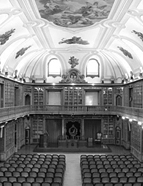

The ACL commission members were particularly interested in the documentation held by the monasteries, namely Arouca and Tibães, the visit to which fell under the charge of Friar Joaquim de Santa Rosa de Viterbo, who was also responsible for the registry offices of the Trás-os-Montes region and Viseu. Friar Joaquim de Santo Agostinho was in charge of the Algarve region, the monasteries of Alcobaça and Leiria and several colleges of Coimbra. The public registry offices and monasteries of Santarém were the responsibility of Friar Joaquim Forjaz. Joaquim José Ferreira Gordo was in charge of the registry offices and archives of Lisbon and Tomar, and also of Spain, as reported in detail in the Notes published in his Memórias de Literatura Portuguesa (Part III, 1792, pp. 1-92). He authored the most detailed policy document on this mission for the Academy, in a letter addressed to José Correia da Serra in July 1789 (ibid, pp. 120-128), explaining the type of public registry offices to be visited (including the court registry offices and the archives of the magistracies, recorders, stockrooms and customs), as well as the registry offices of the monasteries, clergy houses and collegiate churches. He also mentions the advantage of including, "if possible, those of the noblemen of manors, who brought their origin from the period when the lordships and jurisdictions they received from the crown were at their peak" (ibid, p. 121). He refers in particular detail to the tasks that were to be performed by the three people in charge of the Torre do Tombo archive and the other registry offices in Lisbon, describing in detail the operations and registration formalities to be observed. The only region of the country that was not expressly visited was the Alentejo, and it is plausible to suggest that this was due to the remarkable work of Friar Manuel do Cenáculo in the dioceses of Beja and Évora, whose inventory and safeguarding of historical documents and monuments was widely acknowledged and acclaimed. Correia da Serra would later make an extremely laudatory appraisal of these archival studies, considering them fundamental for the most ambitious, but meanwhile abandoned editorial undertaking from which "the true History of Portugal should emerge"(José Correia da Serra, Coup d’oeil sur l’état des sciences et des lettres, 1804, p. cccxlvii).
A second core area of the ACL's activity in the field of history, throughout the period under consideration of 1779-1820, was the compilation, publication and re-edition of unpublished sources. Of particular note is the Colecção de Livros Inéditos de História Portuguesa [Collection of Unpublished Books of Portuguese History], published in five volumes between 1790 and 1824.
